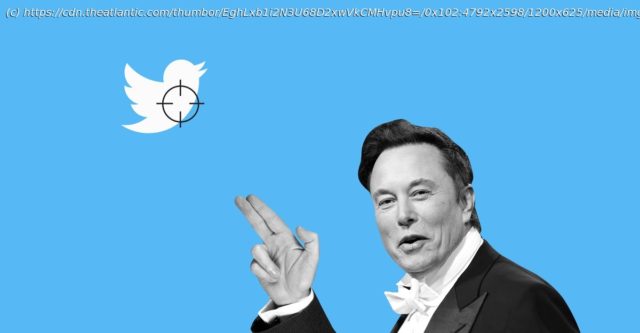There’s more than one way to sink a social network.
Journalists have been declaring Twitter dead for nearly a decade. Observers see flagging user numbers or feel an amorphous, grim vibe shift and pounce, often prematurely. But this week, everyone is fretting and monitoring. As of this writing, Elon Musk appears poised to finalize his Twitter acquisition, and there is, both inside and outside the company, an apocalyptic feel to the ordeal.
At Twitter’s headquarters, in San Francisco, Musk is doing things like wandering around the lobby carrying a porcelain sink (for content purposes) while simultaneously trying to convince employees that he will not, as previously reported, cut 75 percent of staff. One current Twitter staffer told me that “the bootlicking is next level” as anxious employees greet Musk in the hallway, unsure of his plans for his new company and their place in it. Outside the company, power users are mulling plans to bail, and sharing a report that Twitter is already on life support. My timelines are full of earnest eulogies for the platform or fears that it will turn into a 4chan clone once Musk takes the reins. People are waxing nostalgic, sharing greatest-hits threads of good tweets. Dara Lind, a reporter, summed it up succinctly, noting that the whole thing has “big, big last-night-of-camp energy.”
It seems foolish to try to predict what a mercurial person like Musk—who loves to troll and to float ridiculous ideas in public—will actually do to the platform. But it is impossible to ignore that his tenure is an inflection point for the company and, perhaps, for the 2.0 generation of social-media companies, which have been battered by misinformation, a techlash, and changing online behaviors. Platforms and networks rise and fall and even die out naturally—just look at MySpace—but there’s not much precedent for what’s happening with Twitter: A culturally resonant and politically influential platform could, quite suddenly, flame out as the result of new ownership.
Naturally, this has led me to wonder, and to ask those with experience at large platforms, what could Elon Musk actually do to kill Twitter?
Those I spoke with agreed that Musk likely couldn’t flip a proverbial switch to destroy the platform immediately. Any harebrained, Muskian idea for a new feature couldn’t get implemented overnight. One former senior employee I spoke with also argued that high-profile, controversial decisions (like the reinstatement of Donald Trump or Alex Jones) would certainly drive some people off the service but would be unlikely, on their own, to cause a mass exodus. They cited past mass-quit movements like #DeleteFacebook and #DeleteUber as historical analogues, suggesting that it’s pretty hard to get huge numbers of people to log off as part of a moral stand. That said, Twitter already appears to be hemorrhaging power users, and it’s unclear how much more the platform can take.
But Musk could certainly kneecap Twitter via inept management. If he really does cut a significant chunk of Twitter staff, that would cause an organizational nightmare. Even if one assumes there’s bloat in the company, former employees argued that Twitter could still lose all kinds of institutional knowledge in the shuffle. That institutional knowledge would be useful in a crisis—the kind that social-media companies have all the time, such as when high-profile users go renegade, or the site goes down, or traffic unexpectedly surges. Those I spoke with were especially worried about losing site-reliability engineers and members of the internal trust-and-safety team, which handles content moderation.
Even if Musk’s cuts don’t affect these departments, his ownership could possibly trigger a wave of resignations from employees in key infrastructural roles.






